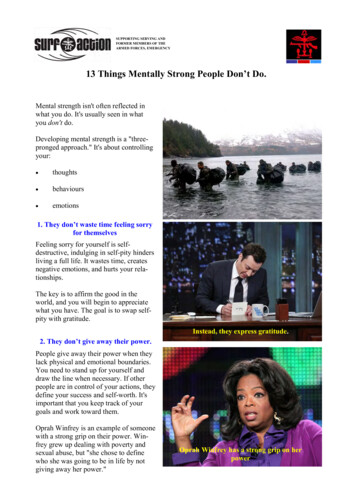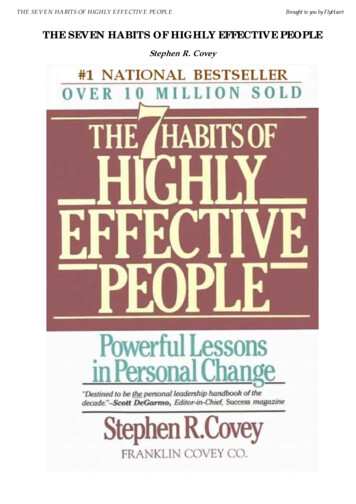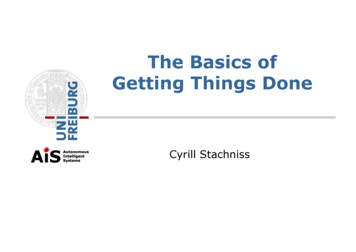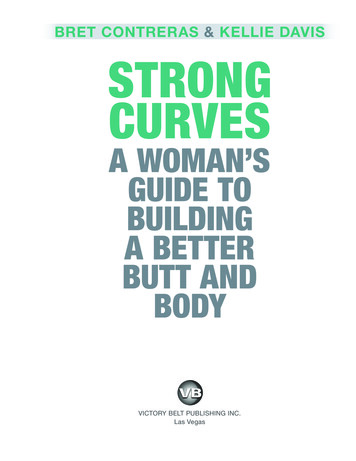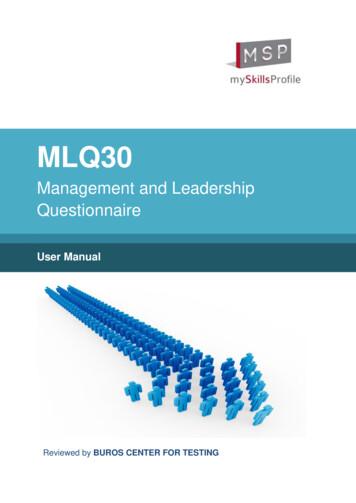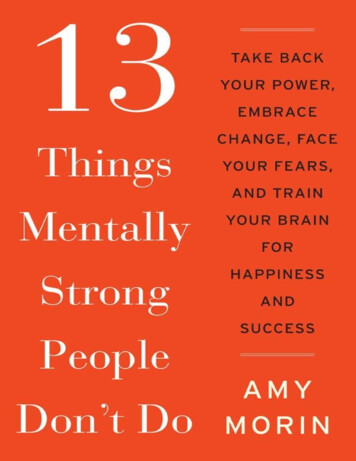
Transcription
DEDICATIONTo all who strive to become better today than they were yesterday.
CONTENTSDEDICATIONINTRODUCTIONWHAT IS MENTAL STRENGTH?CHAPTER 1THEY DON’T WASTE TIME FEELING SORRY FOR THEMSELVESCHAPTER 2THEY DON’T GIVE AWAY THEIR POWERCHAPTER 3THEY DON’T SHY AWAY FROM CHANGECHAPTER 4THEY DON’T FOCUS ON THINGS THEY CAN’T CONTROLCHAPTER 5THEY DON’T WORRY ABOUT PLEASING EVERYONECHAPTER 6THEY DON’T FEAR TAKING CALCULATED RISKSCHAPTER 7THEY DON’T DWELL ON THE PASTCHAPTER 8THEY DON’T MAKE THE SAME MISTAKES OVER AND OVERCHAPTER 9THEY DON’T RESENT OTHER PEOPLE’S SUCCESSCHAPTER 10
THEY DON’T GIVE UP AFTER THE FIRST FAILURECHAPTER 11THEY DON’T FEAR ALONE TIMECHAPTER 12THEY DON’T FEEL THE WORLD OWES THEM ANYTHINGCHAPTER 13THEY DON’T EXPECT IMMEDIATE RESULTSCONCLUSION:MAINTAINING YOUR MENTAL STRENGTHREFERENCESACKNOWLEDGMENTSCOPYRIGHTABOUT THE PUBLISHERS
INTRODUCTIONWhen I was twenty-three, my mother died suddenly from a brain aneurysm.She’d always been a healthy, hardworking, vibrant woman who had loved liferight up until her last minute on earth. In fact, I saw her the night before shedied. We met at an auditorium to watch a high school basketball tournament. Shewas laughing, talking, and enjoying life like she always did. But just twenty-fourhours later she was gone. The loss of my mother affected me deeply. I couldn’timagine going through the rest of my life without her advice, laughter, or love.At the time, I was working as a therapist at a community mental health center,and I took a few weeks off to privately deal with my grief. I knew I couldn’t beeffective at helping other people unless I was able to productively deal with myown feelings. Becoming used to a life that no longer included my mother was aprocess. It wasn’t easy, but I worked hard to get myself back on my feet. Frommy training as a therapist, I knew that time doesn’t heal anything; it’s how wedeal with that time that determines the speed at which we heal. I understood thatgrief was the necessary process that would eventually alleviate my pain, so Iallowed myself to feel sad, to get angry, and to fully accept what I’d truly lostwhen my mother passed away. It wasn’t just that I missed her—it was also thepainful realization that she would never be there again during the importantevents in my life and that she would never experience the things she’d lookedforward to—like retire from her job and become a grandmother. With supportivefriends and family, and my faith in God, I found a sense of peace; and as lifewent on, I was able to remember my mother with a smile, rather than with pangsof sadness.A few years later, as we approached the third anniversary of my mother’sdeath, my husband, Lincoln, and I discussed how to best honor her memory thatweekend. Friends had invited us to watch a basketball game on Saturdayevening. Coincidentally, the game was being played in the same auditoriumwhere we’d last seen my mother. Lincoln and I talked about what it would be
like to go back to the place where we’d seen her, just three years ago, on thenight before she passed away.We decided it could be a wonderful way to celebrate her life. After all, mymemories of her that night were very good. We’d laughed, had a chance to talkabout all kinds of things, and had an all-around great evening. My mother hadeven predicted my sister would get married to her boyfriend at the time—and afew years later that prediction came true.So Lincoln and I returned to the auditorium and we enjoyed spending timewith our friends. We knew it was what my mother would have wanted. It feltnice to go back and feel okay about being there. But just as I took a sigh of reliefabout my progress in dealing with my mother’s death, my entire life was onceagain turned upside down.After returning home from the basketball game, Lincoln complained of backpain. He’d broken several vertebrae in a car accident a few years prior, so backpain wasn’t unusual for him. But just a few minutes later, he collapsed. I calledfor paramedics and they arrived within minutes and transported him to thehospital. I called his mother, and his family met me in the emergency room. Ihad no idea what could possibly be wrong with him.After a few minutes in the emergency room waiting area, we were called intoa private room. Before the doctor even said a word, I knew what he was going tosay. Lincoln had passed away. He’d had a heart attack.On the same weekend that we honored the three-year anniversary of mymother’s death, I now found myself a widow. It just didn’t make any sense.Lincoln was only twenty-six and he didn’t have any history of heart problems.How could he be here one minute and gone the next? I was still adjusting to lifewithout my mother, and now I’d have to learn how to deal with life withoutLincoln. I couldn’t imagine how I would get through this.Dealing with the death of a spouse is such a surreal experience. There were somany choices to be made at a time when I really wasn’t in any shape to decideanything. Within a matter of hours, I had to start making decisions abouteverything from the funeral arrangements to the wording of the obituary. Therewasn’t any time to let the reality of the situation really sink in; it was completelyoverwhelming.I was fortunate to have many people in my life who supported me. A journey
through grief is an individual process, but loving friends and family certainlyhelped. There were times when it seemed to get a little easier and times when itwould get worse. Just when I’d think I was getting better, I’d turn another cornerto find overwhelming sadness waiting for me. Grief is an emotionally, mentally,and physically exhausting process.There were so many things to feel sad about too. I felt sad for my husband’sfamily, knowing how much they’d loved Lincoln. I felt sad about all the thingsLincoln would never experience. And I was sad about all the things we’d neverget to do together, not to mention, how much I missed him.I took as much time off from work as I could. Those months are mostly a bluras I was focused on just putting one foot in front of the other every day. But Icouldn’t stay out of work forever. I was down to just one income and had to getback into the office.After a couple of months, my supervisor called and asked about my plans toreturn to work. My clients had been told I would be out of the office indefinitelywhile I dealt with a family emergency. They weren’t given any type of timeframe about how long I’d be out, since we weren’t really sure what was going tohappen. But now, they needed an answer. I certainly wasn’t done grieving, and Idefinitely wasn’t “better,” but I needed to go back to work.Just like when I’d lost my mother, I had to allow myself time to experience thesorrow head-on. There was no ignoring it or pushing it away. I had to experiencethe pain while also proactively helping myself heal. I couldn’t allow myself tostay stuck in my negative emotions. Although it would have been easy to pitymyself or dwell on my past memories, I knew it wouldn’t be healthy. I had tomake a conscious choice to start down a long road to building a new life formyself.I had to decide whether some of the goals Lincoln and I shared together werestill going to be my goals. We’d been foster parents for a few years and hadplanned to eventually adopt a child. But did I still want to adopt a child as asingle woman? I continued my work as a foster parent, providing mostlyemergency and respite placements, for the next few years, but I wasn’t sure I stillwanted to adopt a child without Lincoln.I also had to create new goals for myself now that I was alone. I decided toventure out and try new things. I got my motorcycle license and bought a
motorcycle. I also began writing. At first it was mostly a hobby, but eventually itturned into a part-time job. I had to renegotiate new relationships with people aswell by figuring out which of Lincoln’s friends would remain my friends andwhat my relationship with his family would be like without him. Fortunately forme, many of his closest friends maintained friendships with me. And his familycontinued to treat me like part of their family.About four years later, I was fortunate enough to find love again. Or maybe Ishould say love found me. I was sort of getting used to life as a single person.But that all changed when I began dating Steve. We’d known each other foryears and slowly our friendship turned into a relationship. Eventually, we startedtalking about a future together. Although I had never thought I’d get marriedagain, with Steve it just seemed right.I didn’t want a formal wedding or a reception that parodied the ceremony I’dhad with Lincoln. Although I knew my guests would be thrilled to see me marryagain, I also knew it would conjure up pangs of sadness for people as theyremembered Lincoln. I didn’t want my wedding day to be a somber occasion, soSteve and I decided to have a nontraditional wedding. We eloped to Las Vegasand it was a completely joyous occasion that centered around our love andhappiness.About a year after we married, we decided to sell the house that Lincoln and Ihad lived in, and we moved a few hours away. We’d be closer to my sister andmy nieces and it gave us an opportunity to have a fresh start. I got a job at a busymedical practice and we were looking forward to enjoying our future together.Just as life seemed to be going great, our road to happiness took another strangetwist when Steve’s father was diagnosed with cancer.Initially, doctors predicted that his treatment could help keep the cancer at bayfor several years. But after a few months, it was clear that he wasn’t likely tosurvive one year, let alone several. He’d tried a few different options but nothingreally worked. As time went on the doctors grew more perplexed by his lack ofresponse to treatment. After about seven months, he’d run out of treatmentoptions.The news hit me like a ton of bricks. Rob was so full of life. He was the kindof guy who could always pull a quarter from behind a kid’s ear and he told someof the funniest stories I have ever heard. Although he lived in Minnesota and we
lived in Maine, we saw him often. Since he was retired, he had the availability tovisit with us for weeks at a time and I’d always joked with him that he was myfavorite houseguest—because he was basically our only houseguest.He was also one of my biggest fans when it came to my writing. He readwhatever I wrote, whether it was an article about parenting or a piece onpsychology. Quite often, he’d call me with story ideas and suggestions.Even though Rob was seventy-two, it felt like he was too young to be so sick.Right up until the previous summer he was motorcycling across the country,sailing around Lake Superior, and cruising the countryside with the top down inhis convertible. But now he was too sick, and the doctors were clear—he wasonly going to get worse.This time I had a different experience dealing with death. My mother’s andLincoln’s deaths were completely unexpected and sudden. But this time, I hadwarning. I knew what was coming, and it filled me with a sense of dread.I found myself thinking, Here we go again. I didn’t want to go through such astaggering loss all over again. It just didn’t seem right. I know plenty of peoplemy age who haven’t lost anyone, so why did I have to lose so many of my lovedones? I sat at the table thinking about how unfair it was, how hard it was goingto be, and how much I wanted things to be different.I also knew I couldn’t let myself go down that road. After all, I’d been throughthis before and I’d be okay again. If I let myself fall into the trap of thinking mysituation was worse than anyone else’s, or if I convinced myself that I couldn’thandle one more loss, it wasn’t going to help. Instead, it would only hold meback from dealing with the reality of my situation.It was at that moment that I sat down and wrote my list “13 Things MentallyStrong People Don’t Do.” They were the habits I’d fought so hard against tocome out on the other side of my grief. They were the things that could hold meback from getting better, if I allowed them to take hold of me.Not surprisingly, they were the same skills I was giving to the clients whoentered my therapy office. But writing them down was something I needed to doto help me stay on track. It was a reminder that I could choose to be mentallystrong. And I needed to be strong, because a few weeks after writing down thatlist, Rob passed away.Psychotherapists are known for helping others build on their strengths, doling
out tips on how they should act and what they can do to improve themselves. Butwhen I created my list on mental strength, I decided to stray for a moment fromwhat has become second nature to me. And focusing on what not to do has madeall the difference. Good habits are important, but it’s often our bad habits thatprevent us from reaching our full potential. You can have all the good habits inthe world, but if you keep doing the bad habits alongside the good ones, you’llstruggle to reach your goals. Think of it this way: you’re only as good as yourworst habits.Bad habits are like heavy weights that you drag around as you go about yourday. They’ll slow you down, tire you out, and frustrate you. Despite your hardwork and talent, you’ll struggle to reach your full potential when you’ve gotcertain thoughts, behaviors, and feelings holding you back.Picture a man who chooses to go to the gym every day. He works out foralmost two hours. He keeps a careful record of the exercises he performs so hecan track his progress. Over the course of six months, he isn’t noticing much of achange. He feels frustrated that he’s not losing weight and gaining muscle. Hetells his friends and family that it just doesn’t make sense why he’s not lookingand feeling better. After all, he rarely ever misses a workout. What he leaves outof the equation is the fact that he enjoys a treat on his drive home from the gymevery day. After all that exercise, he feels hungry and tells himself, “I’ve workedhard. I deserve a treat!” So each day, he eats one dozen donuts on his drivehome.Seems ridiculous, right? But we all are guilty of this kind of behavior. Wework hard to do the things that we think will make us better, but we forget tofocus on the things that might be sabotaging our efforts.Avoiding these thirteen habits isn’t just what will help you through grief.Getting rid of them will help you develop mental strength, which is essential todealing with all life’s problems—big or small. No matter what your goals are,you’ll be better equipped to reach your full potential when you’re feelingmentally strong.
WHAT IS MENTAL STRENGTH?It’s not that people are either mentally strong or mentally weak. We all possesssome degree of mental strength, but there’s always room for improvement.Developing mental strength is about improving your ability to regulate youremotions, manage your thoughts, and behave in a positive manner, despite yourcircumstances.Just as there are those among us who are predisposed to develop physicalstrength more easily than others, mental strength seems to come more naturallyto some people. There are several factors at play to determine the ease at whichyou develop mental strength: Genetics—Genes play a role in whether or not you may be more prone tomental health issues, such as mood disorders. Personality—Some people have personality traits that help them think morerealistically and behave more positively by nature. Experiences—Your life experiences influence how you think about yourself,other people, and the world in general.Obviously, you can’t change some of these factors. You can’t erase a badchildhood. You can’t help it if you are genetically predisposed to ADHD. Butthat doesn’t mean you can’t increase your mental strength. Anyone has thepower to increase mental strength by devoting time and energy on the selfimprovement exercises throughout this book.THE BASIS OF MENTAL STRENGTHImagine a man who feels nervous about social situations. To minimize hisanxiety, he avoids starting conversations with his coworkers. The less he speaks
with his coworkers, the less they initiate conversation with him. When he entersthe break room and passes people in the hallway without anyone speaking tohim, he thinks, I must be socially awkward. The more he thinks about howawkward he is, the more nervous he feels about starting conversations. As hisanxiety increases, his desire to avoid his coworkers also increases. This results ina self-perpetuating cycle.To understand mental strength, you have to learn how your thoughts,behaviors, and feelings are all intertwined, often working together to create adangerous downward spiral as in the preceding example. This is why developingmental strength requires a three-pronged approach:1.Thoughts—Identifying irrational thoughts and replacing them with morerealistic thoughts.2.Behaviors—Behaving in a positive manner despite the circumstances.3.Emotions—Controlling your emotions so your emotions don’t control you.We hear it all the time: “Think positive.” But optimism alone isn’t enough tohelp you reach your full potential.CHOOSE BEHAVIOR BASED ON BALANCED EMOTIONS ANDRATIONAL THINKINGI’m terrified of snakes. Yet my fear is completely irrational. I live in Maine. Wedon’t have a single poisonous snake in the wild. I don’t see snakes very often,but when I do, my heart leaps into my throat and I’m tempted to run as fast as Ican in the other direction. Usually, before I run away, I’m able to balance mysheer panic with rational thoughts that remind me that there’s no logical reasonto feel afraid. Once my rational thinking kicks in, I can walk by the snake—aslong as he’s a safe distance away. I still don’t want to pick him up or pet him, butI can continue past him without letting my irrational fear interfere with my day.We make our best decisions in life when we balance our emotions withrational thinking. Stop and think for a minute about how you behave whenyou’re really angry. It’s likely that you’ve said and done some things that you
regretted later, because you were basing your actions on your emotions, notlogic. But making choices based on rational thinking alone also doesn’t make forgood decisions. We are human beings, not robots. Our hearts and our heads needto work together to control our bodies.Many of my clients question their ability to control their thoughts, emotions,and behavior. “I can’t help the way I feel,” they say. Or “I can’t get rid of thenegative thoughts that run through my head,” and “I just can’t get motivated todo what I want to accomplish.” But with increased mental strength, it’s possible.THE TRUTH ABOUT MENTAL STRENGTHThere’s a lot of misinformation and misconception about what itmeans to be mentally strong. Here are some of the truths aboutmental strength: Being mentally strong isn’t about acting tough. You don’t have tobecome a robot or appear to have a tough exterior when you’rementally strong. Instead, it’s about acting according to your values. Mental strength doesn’t require you to ignore your emotions.Increasing your mental strength isn’t about suppressing youremotions; instead it’s about developing a keen awareness of them.It’s about interpreting and understanding how your emotionsinfluence your thoughts and behavior. You don’t have to treat your body like a machine to be mentallystrong. Mental strength isn’t about pushing your body to its physicallimits just to prove you can ignore pain. It’s about understandingyour thoughts and feelings well enough that you can determine whento behave contrary to them, and when to listen to them. Being mentally strong doesn’t mean you have to be completely selfreliant. Mental strength isn’t about proclaiming that you don’t ever
need help from anyone or any type of higher power. Admitting youdon’t have all the answers, asking for help when you need it, andacknowledging that you can gain strength from a higher power is asign of a desire to grow stronger. Being mentally strong is not about positive thinking. Thinking overlypositive thoughts can be just as detrimental as thinking overlynegative thoughts. Mental strength is about thinking realistically andrationally. Developing mental strength isn’t about chasing happiness. Beingmentally strong will help you to be more content in life, but it isn’tabout waking up every day and trying to force yourself to feel happy.Instead, it’s about making the decisions that will help you reach yourfull potential. Mental strength isn’t just the latest pop psychology trend. Just likethe physical fitness world is filled with fad diets and fitness trends,the world of psychology is often filled with fleeting ideas about howto become your best self. Mental strength isn’t a trend. Thepsychology field has been helping people learn how to change theirthoughts, feelings, and behavior since the 1960s. Mental strength isn’t synonymous with mental health. While thehealthcare industry often talks in terms of mental health versusmental illness, mental strength is different. Just like people can stillbe physically strong even if they have a physical health ailment likediabetes, you can still be mentally strong even if you havedepression, anxiety, or other mental health problems. Having amental illness doesn’t mean you’re destined to have bad habits.Instead, you can still choose to develop healthy habits. It mayrequire more work, more focus, and more effort, but it’s verypossible.
THE BENEFITS OF MENTAL STRENGTHIt’s often easy to feel mentally strong when life is going well, but at timesproblems arise. A job loss, a natural disaster, an illness in the family, or a deathof a loved one is sometimes inevitable. When you’re mentally strong, you’ll bemore prepared to deal with life’s challenges. Benefits of increasing your mentalstrength include: Increased resilience to stress—Mental strength is helpful in everyday life,not just in the midst of a crisis. You’ll become better equipped to handleproblems more efficiently and effectively, and it can reduce your overallstress level. Improved life satisfaction—As your mental strength increases, yourconfidence will also increase. You’ll behave according to your values, whichwill give you peace of mind, and you’ll recognize what’s really important inyour life. Enhanced performance—Whether your goal is to be a better parent, toincrease your productivity at the office, or to perform better on the athleticfield, increasing your mental strength will help you reach your full potential.HOW TO DEVELOP MENTAL STRENGTHYou’ll never become an expert at anything by simply reading a book. Athletesdon’t become elite competitors after reading about their sport nor do topmusicians increase their musical abilities by simply watching other performersplay. They also have to practice.The following thirteen chapters aren’t meant to be a checklist that you eitherdo or don’t do. They are a description of habits that everyone falls prey tosometimes. It’s meant to help you find better ways to cope with life’s challengesso you can avoid these pitfalls. It’s about growing, improving, and striving tobecome a little better than you were yesterday.
CHAPTER 1THEY DON’T WASTE TIME FEELING SORRYFOR THEMSELVESSelf-pity is easily the most destructive of the non-pharmaceuticalnarcotics; it is addictive, gives momentary pleasure and separatesthe victim from reality.—JOHN GARDNERDuring the weeks that followed Jack’s accident, his mother couldn’t stop talkingabout the “horrible incident.” Every day she recounted the story about how bothof Jack’s legs were broken when he was hit by a school bus. She felt guilty thatshe wasn’t there to protect him, and seeing him in a wheelchair for several weekswas almost more than she could bear.Although doctors had predicted a complete recovery, she repeatedly warnedJack that his legs may never fully heal. She wanted him to be aware that he maynot be able to play soccer or run around like the other kids ever again, just incase there was a problem.Although his doctors had medically cleared him to return to school, hisparents decided that Jack’s mother would quit her job and homeschool him for
the remainder of the year. They felt that seeing and hearing school buses eachday might trigger too many bad memories. They also wanted to spare him fromhaving to watch idly from his wheelchair as his friends played at recess. Theyhoped that staying home would help Jack heal faster, both emotionally andphysically.Jack usually completed his homeschool work in the mornings and he spent hisafternoons and evenings watching TV and playing video games. Within a fewweeks, his parents noticed that his mood seemed to change. A normally upbeatand happy child, Jack became irritable and sad. His parents grew concernedthat the accident may have traumatized him even more than they’d imagined.They pursued therapy in hopes it could help Jack deal with his emotional scars.Jack’s parents took him to a well-known therapist with expertise in childhoodtrauma. The therapist had received the referral from Jack’s pediatrician, so sheknew a little bit about Jack’s experience prior to meeting him.When Jack’s mother wheeled him into the therapist’s office, Jack staredsilently at the floor. His mother began by saying, “We’re having such a hard timesince this terrible accident. It’s really ruined our lives and caused a lot ofemotional problems for Jack. He’s just not the same little boy.”To his mother’s surprise, the therapist didn’t respond with sympathy. Insteadshe enthusiastically said, “Boy, have I been looking forward to meeting you,Jack! I’ve never met a kid who could beat a school bus! You have to tell me, howdid you manage to get into a fight with a school bus and win?” For the first timesince the accident Jack smiled.Over the next few weeks, Jack worked with his therapist on making his ownbook. He appropriately named it, How to Beat a School Bus. He created awonderful story about how he managed to fight a school bus and escape withonly a few broken bones.He embellished on the story by describing how he grabbed hold of the muffler,swung himself around, and protected the majority of his body from getting hit bythe bus. Despite the exaggerated details, the main part of the story remained thesame—he survived because he’s a tough kid. Jack concluded his book with aself-portrait. He drew himself sitting in a wheelchair wearing a superhero cape.The therapist included Jack’s parents in the treatment. She helped them seehow fortunate they were that Jack survived with only a few broken bones. She
encouraged his parents to stop feeling sorry for Jack. She recommended theytreat him like a mentally and physically tough kid who was capable ofovercoming great adversity. Even if his legs didn’t heal properly, she wantedthem to focus on what Jack could still accomplish in life, not what the accidentwould prevent him from being able to do.The therapist and Jack’s parents worked with the school faculty and staff toprepare for Jack’s return to school. In addition to the special accommodationshe’d need because he was still in a wheelchair, they wanted to ensure that theother students and teachers didn’t pity Jack. They arranged for Jack to share hisbook with his classmates so that he could tell them how he beat the school busand show them that there was no reason to feel sorry for him.SELF-PITY PARTYWe all experience pain and sorrow in life. And although sadness is a normal,healthy emotion, dwelling on your sorrow and misfortune is self-destructive. Doyou respond positively to any of the points below?You tend to think your problems are worse than anyone else’s.If it weren’t for bad luck, you’re pretty sure you’d have none at all.Problems seem to add up for you at a much faster rate than anyone else.You’re fairly certain that no one else truly understands how hard your lifereally is.You sometimes choose to withdraw from leisure activities and socialengagements so you can stay home and think about your problems.You’re more likely to tell people what went wrong during your day ratherthan what went well.You often complain about things not being fair.You struggle to find anything to be grateful for sometimes.
You think that other people are blessed with easier lives.You sometimes wonder if the world is out to get you.Can you see yourself in some of the examples above? Self-pity can consumeyou until it eventually changes your thoughts and behaviors. But you can chooseto take control. Even when you can’t alter your circumstances, you can alter yourattitude.WHY WE FEEL SORRY FOR OURSELVESIf self-pity is so destructive, why do we do it in the first place? And why is itsometimes so easy and even comforting to indulge in a pity party? Pity wasJack’s parents’ defense mechanism to protect their son and themselves fromfuture dangers. They chose to remain focused on what he couldn’t do as a way toshield him from having to face any more potential problems.Understandably, they worried about his safety more than ever. They didn’twant him to be out of their sight. And they were concerned about the emotionalreaction he might have to seeing a school bus again. It was only a matter of timebefore the pity poured on Jack turned into his own self-pity.It’s so easy to fall into the self-pity trap. As long as you feel sorry for yourself,you can delay any circumstances that will bring you face-to-face with your realfears, and you can avoid taking any responsibility for your actions. Feeling sorryfor yourself can buy time. Instead of taking action or moving forward,exaggerating how bad your situation is justifies why you shouldn’t do anythingto improve it.People often use self-pity as a way to gain attention. Playing the “poor me”card may result in some kind and gentle words from others—at least initially.For people who fear rejection, self-pity can be an indirect way of gaining help bysharing a woe-is
they don’t shy away from change chapter 4 they don’t focus on things they can’t control chapter 5 they don’t worry about pleasing everyone chapter 6 they don’t fear taking calculated risks chapter 7 they don’t dwell on the past chapter 8 they don’t make the same mistakes over and over chapte
